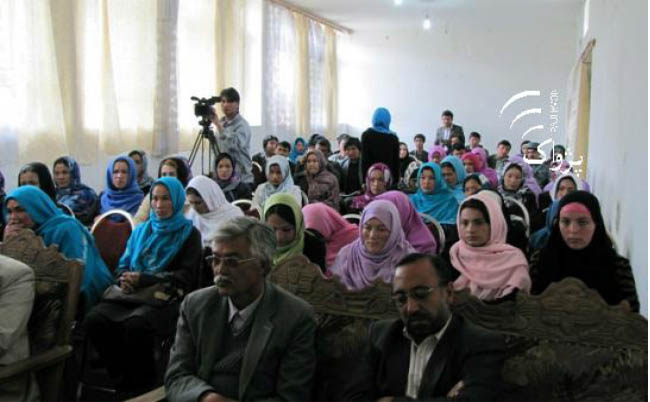BAMYAN - Conflict, poverty and insecurity have long deprived women in central Bamyan province of education, however efforts at reducing women’s illiteracy rate have been launched.
According to the provincial education department, currently 338 schools including 59 primary, 143 secondary and 136 high schools, are active in Bamyan, imparting education to 73,020 boys and 63,235 girls. These students are taught by 3,333 teachers including 805 females.
The department says the current number of teachers is not enough and another 2,380 teachers are required for Bamyan schools. However, the number of uneducated women in Bamyan is higher than men.
Ali Afzali, a culturist, told Pajhwok Afghan News: “A major reason of the large number of uneducated people in this province is that they had grown up in the conflict and were unable to study. Most of the people above 35 years of age are uneducated.”
He said only a limited number of people with medium age found access to education facilities during their migration.
“The number of uneducated women in this age is many times higher compared to men because there had been no education facilities during the revolution time”, he added.
Zulaikha, who studied up to six grade in Bamyan, said she left school due to poverty and had to sell plastics in the city to earn money and purchase bread for her family members.
“We are living in a cave, we have no income and we have to collect plastics or drink packages from city and then sell them at a small amount of money, we pass our life this way,” she said.
“Poverty forced me to leave school while my classmates graduated this year,” she added.
The Ministry of Education (MoE), supported by a number of international organizations, has started efforts and programs to reduce the number of uneducated people, particularly women in the country.
Salima, 40, another resident of Bamyan, said she registered herself in a literacy course to be at least able to read and write.
“I cannot read letters, I also cannot read billboards, so I decided to start a literacy course, I started it from the first class and I hope I would be able to read and write this year,” she said.
Residents evince keen interest in education in Bamyan where two universities are active including a state-owned and a private. High interest of people in education has encouraged even elderly men and women, including government officials in Bamyan, to get admission in universities.
Governor’s spokesman, Abdul Rahman Ahmadi, said most of the new generation (teenagers and youngsters) were educated in Bamyan but most of the previous generation was illiterate.
However, he said the local government was trying to provide more education facilities to people.
“Bamyan has good security, thanks God and the ground for education is paved without any concerns,” he said.
Thousands of people in Bamyan this year were enrolled to literacy courses to be able to write and read.
Sardar Mohammad Rahimi, deputy education minister, said six districts of Bamyan were facilitated with nine-month literacy courses this year. He said the courses were implemented by UNESCO.
“Three hundred and fifty courses launched through this program in which around 10,500 people were enrolled while 5,000 others attend literacy courses of the MoE,” he said.
He said the ministry’s literacy program covered 120 districts across the country and people with most of them women above 15 years of age were attending it.
“These students will graduate as third graders who can be enrolled to the Vital Literacy School to continue their education”, he said.
On the other hand, Bamyan acting education director said: “Decades of conflict, violence and poverty have deprived a large number of people from education, but now they are interested to learn read and write.”
However, people with higher education degrees in Bamyan complain about lack of job opportunities.
Zainab, a resident of Waras district who has degree in sociology, said she had been seeking job for the past two years but she was not even granted a teacher job.
She said she applied for job at three government and nongovernmental organizations, but she was not even shortlisted.
“When you study for 16 years but remain jobless, it would be good to learn only read and write because more study in Afghanistan is useless both for the society and the person himself,” she said.
But Hussaindad Ahmadi, head of the Afghanistan Civil Society Forum (ACSF) for Bamyan, said, “We should not get education just only to get jobs, but we should get it for its importance in life and training our children.”
He said many people expected jobs after higher education but the government had no capacity to employ all educated people. Only a limited number of people in foreign countries were employed in government organizations while a large part of them worked in the private sector, he added.
Rahila Sharifi, a businesswoman in Bamyan who has graduated from literature, said she was satisfied with her own business.
According to national and international organizations, nearly 11 million Afghans above 18 years of age are uneducated or had only primary education. In general, 60 percent of Afghans including 63 percent men and 90 percent women are uneducated.(Pajhwok)
Home » Afghanistan » Efforts on to Reduce Bamyan Women Illiteracy
Efforts on to Reduce Bamyan Women Illiteracy

